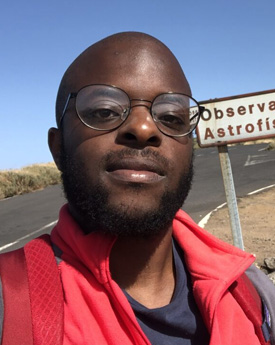Professor Brooke Simmons
Professor in AstrophysicsPhD Supervision Interests
The growth of galaxies and supermassive black holes Galaxies build up their complex structures over billions of years via a diverse set of processes, including interactions with other galaxies and more solitary in-situ processes. The vast majority of galaxies also host a central supermassive black hole, and these black holes accrete and grow via processes that correlate their masses with the properties of their host galaxies. Some of the most fundamental questions about these processes are not yet answered, such as: how important are galaxy mergers to the co-evolution of galaxies and supermassive black holes? By what non-merger processes can a supermassive black hole accrete enough material to sustain the observed range of luminosities at which we observe them? Are the detailed physical processes of normal matter in galaxies critical to the nature of black hole-galaxy correlations, or do such processes depend solely on more fundamental properties driven by the size and shape of the dark matter halo? With the latest generation of telescopes and high-resolution cosmological models, we are starting to answer these questions. Investigation of these topics during a PhD project will involve data reduction and analysis of multiwavelength, multi-channel observational data, including spectroscopy and images from the Hubble Space Telescope. A key aim is to isolate and analyse the "merger-free" channel of black hole and galaxy growth, via galaxy morphological indicators. This will involve hands-on work with large datasets as well as working with and writing code. The student will join multiple established, productive communities, such as the Galaxy Zoo project. They will likely also have the opportunity to gain hands-on observing experience at world-class telescopes. This project is subject to availability of funding. Galaxy evolution with the next generation of telescopes The first images of the early Universe from JWST have raised at least as many questions as they have answered about galaxy evolution. Further upcoming missions and surveys promise to do the same. Why are disk galaxies so common at high redshift? How do they grow to the masses at which they are observed, and how do we expect them to evolve to later times? For example, could they be the progenitors of galaxies like the Milky Way? How do we reliably identify disk galaxies and galaxies with other dynamical and morphological configurations in the large datasets provided by upcoming surveys? Investigation of these topics during a PhD project will involve analysis of multiwavelength, multi-channel observational data. This will include hands-on work with large datasets as well as working with and writing code. The student will join multiple established, productive communities, such as the Galaxy Zoo project. The student will have the opportunity to lead a data release of a morphological sample from at least one of the latest generation of surveys (e.g. from JWST, Euclid, or LSST, depending on timing and student interest). It is likely this will involve machine learning techniques, as well as combining machine classification predictions with citizen science classifications. The student will likely also have the opportunity to gain hands-on observing experience at world-class telescopes. This project is subject to availability of funding.
FLF: Leading the Next generation of Data Driven Discoveries - renewal
01/02/2025 → 31/01/2028
Research
RAS travel grant (Izzy Garland)
01/02/2024 → 30/04/2024
Research
The Limits of Our Telescopes: The Case of NGC 5907 (Summer Student: Evie Day)
01/07/2023 → 30/09/2023
Research
Lancaster University Observational Astrophysics 2021-2024 (OAstro21)
01/04/2021 → 31/03/2025
Research
FLF:Leading the Next Generation of Data-Driven Discoveries
01/02/2021 → 31/01/2025
Research
Innovative Digital Citizen Science: Active Learning for Disaster Relief
01/01/2020 → 30/09/2020
Research
Crowdsourcing and Machine Learning for Disaster Relief and Resilience
01/04/2019 → 28/02/2021
Research
IAA: Astrophysical Analysis Tools for Disaster Relief & Resilience
01/01/1900 → …
Research
National Astronomy Meeting 2019
Participation in conference -Mixed Audience
Observational Astrophysics
Observational Astrophysics
Observational Astrophysics
- Observational Astrophysics




